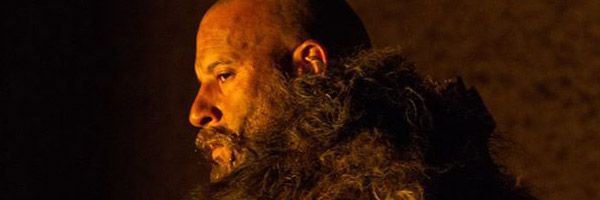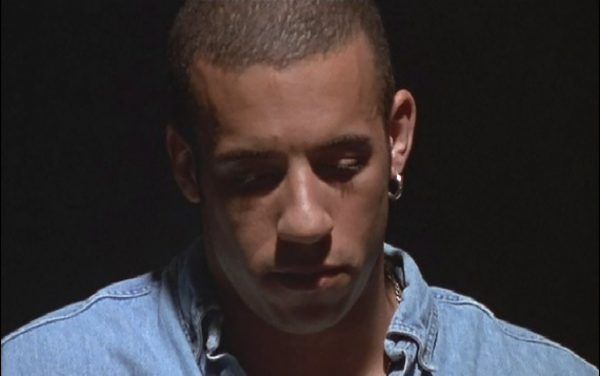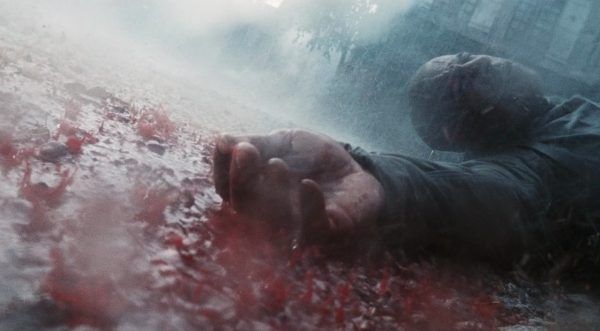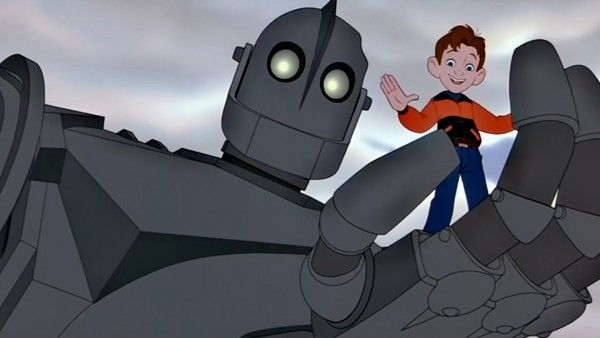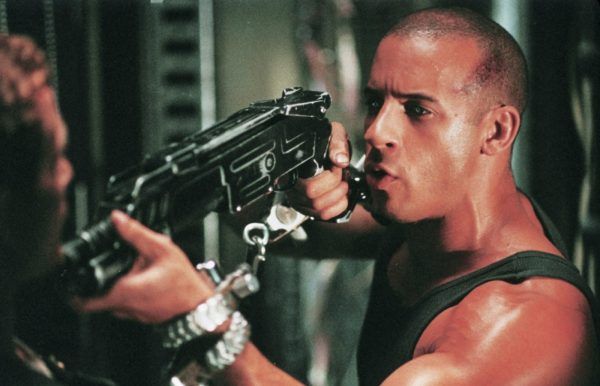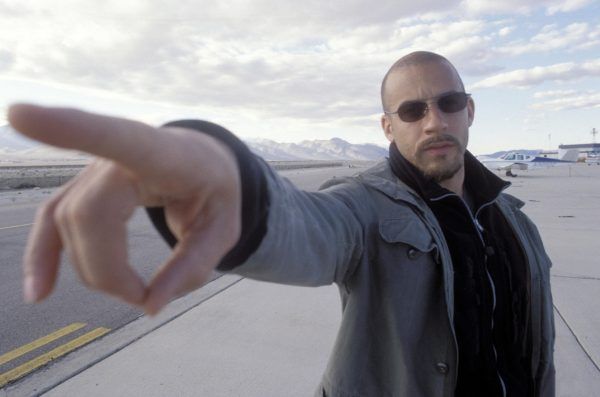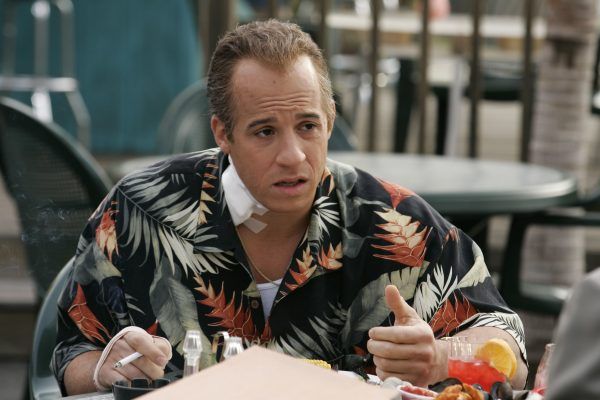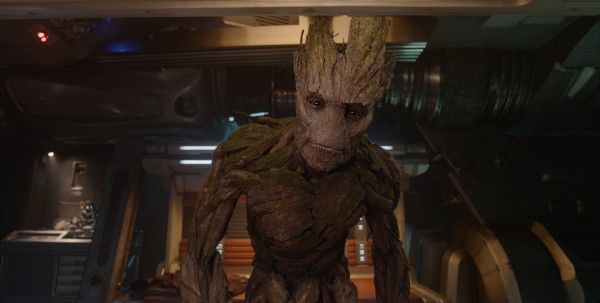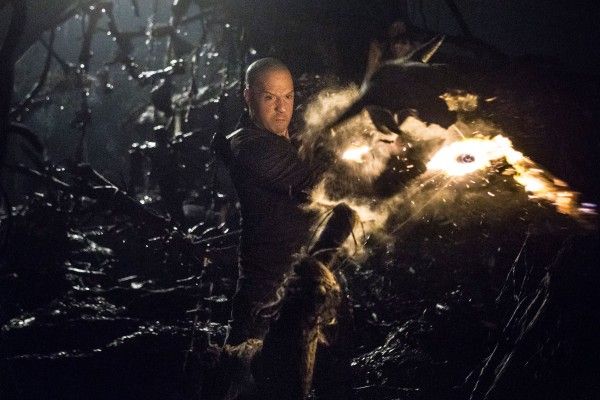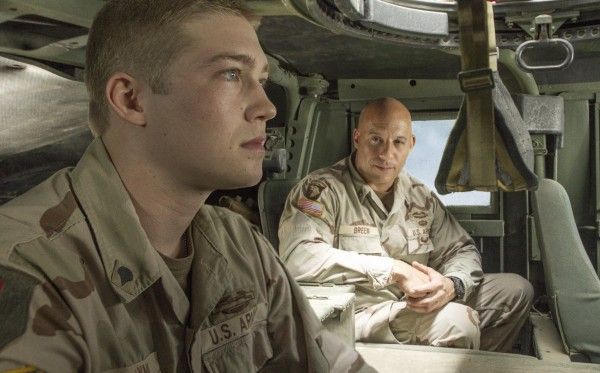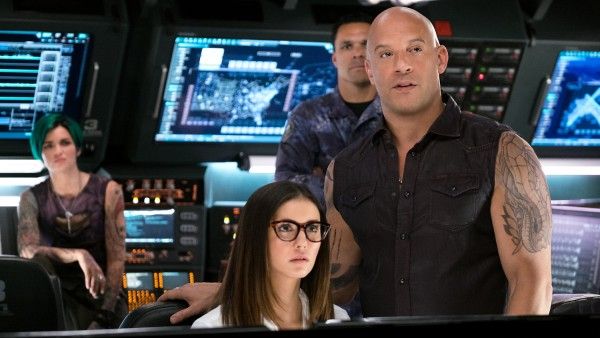Vin Diesel rules. If you’ve seen any of his Fast and Furious films, you know this. He looks like a standard tough guy, a bruising action hero with an inimitable growl that intimidates his scene partners to huge box office returns. But underneath this exterior -- not even that far underneath, frankly -- lies a gigantically loving, beating heart. The catchphrase of the Fast and Furious franchise has nothing to do with cars, action setpieces, or even Dwayne Johnson. It’s “family.” And Diesel, as a screen performer, is transparently interested in creating and highlighting families however he can.
In celebration of Diesel’s work -- Bloodshot opens in theaters this weekend -- and his general wholesomeness, I decided to take a deep dive into some of his performances we may not be as familiar with. These are the best Vin Diesel performances that have nothing to do with the Fast and Furious franchise -- and they reveal just how wonderfully human Diesel is as a performer.
Multi-Facial
Director/Writer: Vin Diesel
Cast: Vin Diesel, Lewis Steidl, Cara Gaffen, Phillip Jones, Ivan Jordain, F. Valentino Morales, Erik Stephen, Ruthy Otero
It is unreal how good Vin Diesel is in the 1995 short film Multi-Facial. And not just as a leading actor, but as a screenwriter and director, too. The film, rendered in captivating, engaging, realistic long takes, follows Mike, an aspiring actor with what those in the biz might call “ethnic ambiguity,” on his day-to-day life moving from audition to audition. Mike (and thus Diesel) code switches with effortless commitment, going out for roles ranging from Italian, Latino, and African-American, all confounding the casting directors and fellow actors with the cracks in his details that won’t quite line up with pure authenticity. And yet, Diesel himself gives perhaps the most authentic performance I’ve ever seen from him, giving us glimpses into the pained, sensitive, yearning, and still capably professional soul of a young actor -- after an introductory monologue from a tough-talking Guido dropping problematic slurs like they’re nothing, the hard cut to Diesel speaking softly on the telephone about how he finds such material offensive got me right in the heart. Diesel the filmmaker is so interested in finding unadorned truth, his style feeling like a beautiful intersection between Spike Lee and Jim Jarmusch. The final moments of the short film -- available for you to watch right the hell now on YouTube -- are so simple, pure, and effective, a love letter to the craft of acting, a sardonic stab at the unfair business of acting, a deep but unpretentious examination of identity. Diesel -- if you feel like making stuff like this again anytime soon, I am here for it.
Saving Private Ryan
Director: Steven Spielberg
Writer: Robert Rodat
Cast: Tom Hanks, Edward Burns, Matt Damon, Tom Sizemore
Based on the strength of Multi-Facial, a director by the name of Steven Spielberg decided to cast Diesel in a World War II epic by the name of Saving Private Ryan. The movie is an assault on the senses, a shoulder-grabbing depiction of visceral horrors combined with a descent into the depths of human emotion. It features, like, “every good male actor” from the 1990s -- including a wonderfully “more annoying than you’d expect” Matt Damon. And yet, Diesel cuts through all of this noise, immediately turning heads and gaining notice in his small role as Private Adrian Caparzo. Spielberg straight up wrote the part of Caparzo for Diesel after watching Multi-Facial (“I’m jumping, I was living in North Hollywood, and I remember jumping up on my bed, and I had to be careful because I almost hit myself and knocked myself out,” said Diesel of getting the phone call), and you can see how much the role plays to Diesel’s strengths of empathy and absorption. In his most intense scene, Diesel insists on saving a little girl’s life, despite the madness of war and his fellow soldiers’ protests around him -- even Tom Hanks screams the F-word at him and tells him to follow orders. But Diesel, a paragon of quietly doing the right thing, doubles down on it being “the decent thing to do,” ensuring this girl’s life is saved -- at the cost of his own. He’s shot by German snipers for his troubles, and watching Diesel shift stoically yet swiftly from the bullets entering his body to continuing the fight to its last possible moments is a masterclass in physical screen acting. In his character’s final moments, the rest of the cast gathers around him, watching him die -- a perfect visualization for the sneaky impressiveness of Diesel’s work.
The Iron Giant
Director: Brad Bird
Writers: Tim McCanlies, Brad Bird
Cast: Eli Marienthal, Vin Diesel, Harry Connick Jr., Jennifer Aniston, James Gammon, Cloris Leachman, John Mahoney, Christopher McDonald, M. Emmet Walsh
“What if a gun had a soul?” This central idea, crafted by co-writer and director Brad Bird from the children’s book by Ted Hughes, is the narrative soul of The Iron Giant. And Vin Diesel, in playing the title character and this central conflict, imbues this soul with bountiful, emotional, heartbreaking heart. The 1999 film, a brilliant dive into the world of 1950s Cold War paranoid America, finds a young boy named Hogarth Hughes (Eli Marienthal) who comes into contact with, well, an iron giant. Hogarth takes it upon himself to teach the Giant how to live in the world as a good, decent soul -- using Superman as a guidepost, of course -- while trying to hide the rather large machine from his mom (Jennifer Aniston) and the cowardly government official determined to find and destroy the Giant (Christopher McDonald). Bird has an embarrassment of riches in his voice cast -- I haven’t even gotten to how effortlessly cool Harry Connick Jr. is -- but Diesel stands out. Because, as a performer, Diesel is such an inherently good listener, absorber, and practitioner of empathy, the Giant’s journey of learning how to live and how to differentiate between good and evil is imbued with exquisite sensitivity. Diesel plays the clash of contexts of his character being so naive and so, well, “an iron giant” for both delightful moments of fish-out-of-water comedy and heart-expanding moments of aching growth. If you’ve not seen the film, I will not spoil its final moments, nor Diesel’s final words spoken, but I will say this -- you will cry.
Pitch Black
Director: David Twohy
Writers: Ken Wheats, Jim Wheats, David Twohy
Cast: Vin Diesel, Radha Mitchell, Cole Hauser, Keith David
“All you people are so scared of me. Most days I take that as a compliment. But it ain’t me you gotta worry about now.” This line of dialogue, growled perfectly by the instantly-iconic Diesel as the instantly-iconic Riddick in the instantly-iconic sci-fi horror Pitch Black, is a perfect summation of why it’s all so instantly iconic. Riddick is a vicious space criminal being transported to a new space prison, when the spaceship crashes on a desert planet, forcing all survivors to reckon with vicious space aliens interested in death. Thus, Riddick forms an uneasy alliance with the crew to stop these aliens and save each other. And the crew (led by a wonderful Radha Mitchell) is, indeed, scared of Riddick. Now, most other performers would take a second line like “Most days I take that as a compliment” and relish in the braggadociousness of it, turning Riddick into a more traditional antihero. But Diesel, instead, softens. He tinges this with a touch of irony, of melancholy. He sounds resigned to his state as a heavy, intertwined with his reputation, burdened with the knowledge that he must stay “scary” to survive. It gives his third line -- the threat of another threat -- reason to be listened to. And it gives the rest of his performance such intriguing depth, such a reason to keep following him despite his dangerous reputation. Pitch Black is a stripped and sparse creature feature -- to its benefit. The fact that Diesel can do so much with a film that’s designed to thrive by doing so little speaks volumes to his skills as a formidable performer.
A Man Apart
Director: F. Gary Gray
Writer: Christian Gudegast, Paul Scheuring
Cast: Vin Diesel, Larenz Tate, Timothy Olyphant, Geno Silva, Steve Eastin
I’m gonna start with a harsh truth: Vin Diesel’s facial hair in this film is weird and bad. It’s like a half goatee with stubble creeping it at the seams. It’s bushy, unkempt, strange, and unattractive. And I wouldn’t have it any other way. On paper, A Man Apart feels like your average vigilante thriller (which is to say, I am bound to like it at least a little). An undercover DEA agent (Diesel) loses his wife (Jacqueline Obradors) in a cartel revenge killing gone wrong, and Diesel moves outside of the law to track down the mysterious killer called “Diablo” and get his revenge. But Diesel -- physicalized by his wack-ass half-beard -- ain’t interested in “on paper.” He, alongside the eternally underrated genre auteur F. Gary Gray (who went on to direct Diesel in The Fate of the Furious), are more interested in digging to the desperate depths of this character, recognizing his actions not as performatively badass action bullshit, but as the last course of action possible. Diesel as a purely “bad person” typically doesn’t sing for me -- I think he’s too interested in finding pockets of empathy and inclusion wherever he can to be a standard “tough guy.” But this conflict of performer instinct and material works wonders for the picture. In familiar, trope-laden scenes where he intimidates witnesses, beats up people he shouldn’t beat up, and growls and curses threats to whoever he needs to, he imbues them with hardened regret -- giving it all a genuine sense not just of menace, but of pity, of sympathy, of understanding. In one particularly intense scene uploaded to YouTube, a commenter summarized Diesel’s work succinctly: “Everyone’s an outlaw until the outlaw shows up.” Real outlaws are just that -- real.
Find Me Guilty
Director: Sidney Lumet
Writers: Sidney Lumet, T.J. Mancini, Robert J. McCrea
Cast: Vin Diesel, Peter Dinklage, Linus Roache, Ron Silver, Annabella Sciorra, Alex Rocco
And now for something completely different. In the mid-2000s, American film maestro Sidney Lumet discovered the ease and quick-to-set-up-quick-to-shoot convenience of digital cinema. His first foray into this world? Find Me Guilty, featuring a central Vin Diesel performance unlike anything else he’s ever done. And to see Lumet working out of his comfort zone alongside Diesel working out of his comfort zone is an utterly winning, captivating, entertaining combination. Diesel, wild wig worn and boisterous belly protruding (seriously, Diesel is in love with his belly in this film), plays real-life mobster Jackie DiNorscio, a member of the New Jersey Lucchese crime family. When the district attorney (Linus Roache) charges the majority of this family with a thorough RICO indictment (Racketeer Influenced and Corrupt Organizations), Jackie decides to represent himself -- resulting in the longest federal trial ever held. In these showcase courtroom scenes, where Jackie himself questions witnesses and generally screws up the legal system, Diesel is given such a chance to shine with broad comedy. “I’m not a gangster, I’m a gagster,” says Diesel, and boy do I believe him. I love the way he stalks the room, surrounded by people in Lumet’s “everyone in focus!” digital wide shots. I love the way he elongates his mouth, flattening and smushing his articulations, smiling through the wackiest of moments. And conversely, I love the quieter, more sincere moments of performance. Diesel is excellent at understanding the macro function of a scene, knowing when to shift from high to low status subtly and effectively. Plus: Like his Fast and Furious work, Diesel/Jackie is all about “family,” refusing to rat out his loved ones even when they hurt him. It’s a beautiful, light yet heavy, unique, worthy performance from an underrated film well worth your time.
Guardians of the Galaxy
Director: James Gunn
Writers: James Gunn, Nicole Perlman
Cast: Chris Pratt, Zoe Saldana, Dave Bautista, Vin Diesel, Bradley Cooper, Lee Pace, Michael Rooker, Karen Gillan, Djimon Hounsou, John C. Reilly, Glenn Close, Benicio del Toro
Can a film in which the only words Vin Diesel utters are “I am Groot” really qualify as one of Diesel’s best performances? The answer, of course, is, “I am Groot.” Er, “yes.” In Guardians of the Galaxy, a rock-em-sock-em whiz-bang kind of superhero picture which James Gunn stuffs to the gills with highly imaginative visualscapes, one of the most charismatic casts ever assembled in a modern blockbuster, rollicking one-liners, and a dope as hell soundtrack, Diesel still cuts through the noise with these three simple words. In case you’re wondering what a Groot is, it is of course a giant, loving tree creature that’s best friends with a vicious raccoon (Bradley Cooper) and only speaks the words “I am Groot” as its entire language. Would a lesser actor phone this performance in? Thankfully, Diesel is anything but. He finds the shades and nuances in every single “I am Groot” uttered, charging head-first into the challenge of a subtext-only performance with mastery and -- per usual -- sensitivity. This was Diesel’s first performance after the death of his friend Paul Walker -- as he puts it, “the first time I came back to dealing with human beings after dealing with death, so playing a character who celebrates life in the way Groot does was very nice.” Groot is, indeed, a pure character of love and earnest celebration, but that doesn’t mean he’s a simple character. In fact, there is one time Groot does not say “I am Groot,” and that one time is one of the best line readings of cinema history, end of story.
The Last Witch Hunter
Director: Breck Eisner
Writers: Cory Goodman, Matt Sazama, Burk Sharpless
Cast: Vin Diesel, Elijah Wood, Rose Leslie, Julie Engelbrecht, Michael Caine
Vin Diesel is an avid Dungeons & Dragons player. The Last Witch Hunter is a film heavily based on Diesel’s Dungeons & Dragons character. Thus, to truly understand the psyche of Diesel as a performer, an artist, and a man with a point of view on the values of the world, it is imperative that you watch The Last Witch Hunter. Luckily for you, despite its not-so-great critical notices, it is an absolutely entertaining watch. These days, Diesel’s screen presence is typically used in very modern, traditionally masculine stories -- to see him center a fantasy work full of magic, wizards, warlocks, and witches is an unorthodox match made in heaven, a choice that solidifies the picture as not your average “British-accented fantasy jargon-dump.” I love watching Diesel in this film’s action sequences -- while they are often too rife with blasts of anonymous CGI (and, it must be said, some spookily surreal moments of mind-bending CGI), Diesel’s silent determination and commitment as Kaulder, an immortal witch hunter, grounds these scenes with tangibility and genuine stakes. It’s beyond obvious that Diesel is having fun making this picture -- literally LARPing a character he’s been playing for years -- but he’s not giving a self-indulgent performance. He recognizes the material’s weight, its mythological life-or-death consequences, and its emotional core. To see Diesel, in a final action sequence, clutch the visions of his wife and daughter tightly in order to become reborn is Diesel’s emotional purview in a nutshell. If Diesel is correct and we are getting a Last Witch Hunter sequel, buddy, I’m first in line.
Billy Lynn's Long Halftime Walk
Director: Ang Lee
Writer: Jean-Christophe Castelli
Cast: Joe Alwyn, Kristen Stewart, Chris Tucker, Garrett Hedlund, Makenzie Leigh, Vin Diesel, Steve Martin
Watching Vin Diesel in Billy Lynn’s Long Halftime Walk is a curious thing. Ang Lee’s film is all pitched at a hyperreal-cascading-into-surreal speed (literally, if you watched it in its intended 120 frames per second rate), giving Diesel’s Sergeant Shroom and his predilection for explicit discussions of philosophy, karma, and love around the madness and hate of war a particularly otherworldly quality. I am not criticizing: It’s a look that Diesel wears well. In fact, particularly when watched right after, there’s a fan theory video I’m considering making positing that Billy Lynn’s Long Halftime Walk takes place in an alternate reality where Diesel’s Saving Private Ryan character survives World War II through the power of empathetic love, and ages so gracefully and so beyond our comprehension of space and time, that he can show up in the Iraq War to deliver Billy Lynn (Joe Alwyn) the advice he needs. Diesel’s voice by this point in his career has become dramatically low and gravelly, yet comforting. Particularly when combined with his loving, gleeful smile, it gives Diesel’s “would be hard to perform by any other actor” speechifying that delightful combination of sincerity without pretension. His final scene with Alwyn, a gobsmackingly earnest moment of surreal sentimentality, fits Diesel’s wheelhouse like a glove. When he says “I love you,” prompting all the other soldiers to respond in kind, it’s just pure.
xXx: Return of Xander Cage
Director: D. J. Caruso
Writer: F. Scott Frazier
Cast: Vin Diesel, Donnie Yen, Deepika Padukone, Kris Wu, Ruby Rose, Tony Jaa, Nina Dobrev, Toni Collette, Samuel L. Jackson
A personal anecdote, if you’ll indulge me. xXx: Return of Xander Cage was the first film I saw in a theater after the presidential inauguration of one Donald Trump. I was, simply, feeling crazy. And what I needed to feel a temporary sense of stability was, paradoxically, the utter screen insanity of xXx: Return of Xander Cage. If you think the recent Fast and Furious films walk over the line of live-action cartoon, xXx: Return of Xander Cage pops a wheelie over it and then douses it in gasoline and sets it on fire and the fire turns into the shape of a guitar. It is, in other words, fun as hell. The set pieces are exaggerated but clear, providing us pure escapism with no pretense or need of “grit.” The performers are having the absolute time of their life (Toni Collette: Please be in every movie). The script trots around the dang globe with a joie de vivre that also manages to be in direct dialogue with the problematics of Trumpian politics (don’t @ me!). And at the center of it all, with a wide grin and open arms: Vin Diesel. He’s returning to the starring role of the franchise, having first appeared in the original, grittier 2002 picture xXx (a great performance with a much different tone). And he seems thrilled, delighted, pleased to welcome us on his family reunion. He’s the perfect grounding force in an inherently ungrounded film, but he’s not calling out the film’s unusual logic. Rather, Diesel takes a step back and visibly appreciates how much fun the movie is, allowing us to surrender to its madcap delights. It’s self-aware without being “self-aware.” It’s the perfect indicator of an actor willing to give his project exactly what it needs. I love this movie, and I love Vin Diesel. I am Groot.

